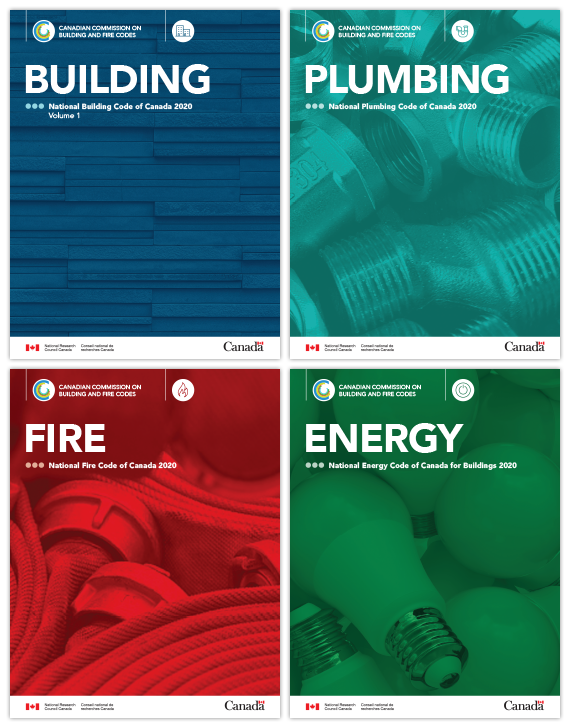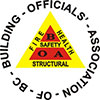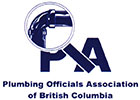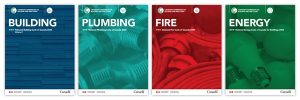
Latest Editions of the National Model Codes
As of March 28, 2022, code users can access the latest, updated editions of the National Model Codes, including the National Building Code of Canada 2020, the National Fire Code of Canada 2020, the National Plumbing Code of Canada 2020, and the National Energy Code of Canada for Buildings 2020. The Codes are developed by the Canadian Commission on Building and Fire Codes (CCBFC), and are published by the National Research Council of Canada (NRC).
The CCBFC has included nearly 400 updates in the latest editions of the National Model Codes. These replace the 2015 and 2017 editions of the codes.
How to access the codes
The 2020 National Model Codes are available for free, in electronic format, through the NRC’s Publications Archive and for purchase, in printed format, from the NRC’s Virtual Store
Previous editions of the codes also remain available through these websites.
Provincial and territorial code regulations
Provincial and territorial governments have legislative authority over building design and construction within their jurisdictions, and adopt or adapt the National Model Codes into regulation in order for them to come into effect.
Provinces and territories were provided with advance copies of the latest code changes in December 2021, so that they could prepare regulations based on the updates.
Current provincial and territorial building, fire, plumbing and energy regulations will remain in effect until these latest editions of the National Model Codes are adopted, with or without modifications, by the provincial or territorial authority having jurisdiction.
For enquiries about the active code regulations in your jurisdiction, please contact your provincial or territorial ministry.
About the code development process
The CCBFC develops the National Model Codes on a 5-year cycle. It is the organization responsible for the independent code development process, and the regular review and updating of the codes.
The NRC provides the CCBFC with administrative support and evidence-based knowledge to inform the Commission’s technical committees.
Contact
For information about the code changes and provisions in the National Model Codes or details about the National Model Codes development system, please contact the CCBFC at CCBFCSecretary-SecretaireCCCBPI@nrc-cnrc.gc.ca.
December Building Code Webinar
Please click here to view the Fire Stopping – Dampers (Part 2) presentation from December 2, 2021.
CPD Offering – Office of the Ombudsperson – Online Training and Webinars – Ongoing
Presentation Topic: Office of the Ombudsperson – Online Training and Webinars
Date: Ongoing
Time: Various options
Registration Fee: No Charge
Registration: Click here to register
CPD Eligibility: 1 point per hour – Category A4
Available Online training & webinars:
The BC Ombudsperson’s Office has a number of online training materials available to support you in learning about administrative fairness.
Fairness 101: An Introduction to Administrative Fairness
Our free, 1-hour online course provides participants with an overview of the principles of administrative fairness and teaches learners how to recognize and apply these principles in their work. It focuses on how to be fair when making and communicating decisions that directly impact members of the public to ensure excellence in service delivery and prevent complaints from escalating.
This introductory course, based on our popular in-person Fairness in Practice workshops, is a key component of our office’s prevention programming and serves as a foundation for all public sector employees regardless on their role.
To register, visit our online learning portal
Administrative Fairness in the Public Service: Webinar Series
We have several webinars that are designed to help you deliver your services more fairly. Please visit our events page for upcoming webinars and information on how to register. Our past webinars are below.
The Essentials of Fair Complaint Handling
Learn some key principles for effective complaint handling with a focus on how to resolve complaints at the point they are received. We will cover some of the highlights of our office’s Complaint Handling Guide.
Fairness Matters: Making Fair Decisions
This webinar features BC Ombudsperson, Jay Chalke and Ministry of Attorney General Lawyer, Laurel Courtenay, discussing the importance of making fair, defensible and reasonable decisions.
Fairness in Practice: Aspects of Procedural Fairness
This webinar outlines the concept of procedural fairness in administrative decision making and provides participants with essential knowledge to support fairness in service delivery.
Fairness in Practice: Why Relationships Matter in Public Service Delivery
This webinar covers the essentials of building relationships with public service users and building fair treatment into public service delivery. It also provides some informal resolution tips, discusses how to respond to challenging behaviour, and looks at managing the effects of complaints.
Quarterly Reporting Webinar
The first in a series of webinars for public authorities, the Quarterly Reporting Webinar focuses on the updates provided to organizations about complaint files.
Organization Overview:
Ombuds-person
It’s a strange word, but an important service.
We assist with and investigate complaints from members of the public about the administration of government programs and services. Whether it’s a delay in receiving service or a disagreement with a decision made, we impartially listen and work to find fair solutions to problems that come to us. Under BC’s new whistleblower protection law (the Public Interest Disclosure Act) we also investigate allegations of wrongdoing and reprisal brought forward by current and former provincial government employees. Finally, we share our expertise in promoting fairness through educational workshops, webinars, guides and other resources with public sector organizations. Our services are free and confidential.
We help public sector organizations be more fair and accountable by:
- Listening, assessing and responding to enquiries and complaints from the public
- Educating citizens and public organizations about how to be fair in the delivery of services
- Conducting thorough, impartial and independent investigations
- Resolving complaints and recommending improvements to policies, procedures and practices
- Reporting publicly to bring attention to issues that impact the public
BOABC Fall 2021 Newsletter – Issue #2
Click here to view the BOABC Newsletter – Fall 2021 – Issue #2
September Plumbing Code Webinar
The BOABC held its first Plumbing Code Webinar on September 23, 2021.
There will be a fourth Building Code Webinar on October 28, 2021, stay tuned for details.
August Building Code Webinar
The BOABC held a third Building Code Webinar on August 26, 2021. Please click here to view this presentation.
There is a Plumbing Code Webinar being planned for September 23, 2021.
July Building Code Webinar
The BOABC held a second Building Code Webinar on July 29, 2021. Please click here to view this presentation.
The next Building Code Webinar will be held on August 26, 2021.
There is a Plumbing Code Webinar being planned for September 23, 2021.
The Professional Governance Act – How does this impact the permitting process
On April 29, 2021, Engineers and Geoscientists BC distributed information to municipalities and regional districts about new legislative requirements from the Professional Governance Act (PGA) that affect the practice of engineering and geoscience.
The PGA has introduced the requirement for Engineers and Geoscientists BC to regulate entities in the public and private sector that engage in the practice of professional engineering or geoscience. Starting July 2, 2021, firms that engage in the practice of professional engineering or geoscience will be required to register with Engineers and Geoscientists BC and hold a Permit to Practice.
Building Officials need to be aware of this change and how it impacts the permitting process. Beginning October 1, 2021, Professional Engineers are required to provide their firm’s Permit to Practice number (a seven digit number) with permit applications to provide proof of registration with Engineers and Geoscientists BC. Local authorities may wish to review building bylaws, application forms, and administrative processes to ensure consistency with these new requirements.
General information and background on this regulation can be found in this document prepared by Engineers and Geoscientists BC , at the website egbc.ca/firms, or by contacting Engineers and Geoscientists BC directly at firms@egbc.ca or 604-430-8035.
BOABC Summer 2021 Newsletter – Issue #1
Click here to view the BOABC Newsletter – Summer 2021 – Issue #1




